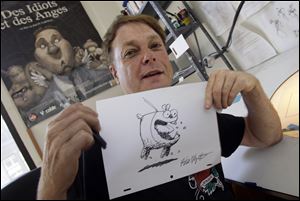
Investment banker bets short films could reel in cash
9/29/2010
Animator Bill Plympton shows off one of his characters, 'Guard Dog.' He encourages new filmmakers to make cheap, funny shorts. Carter Pilcher founded Shorts International, which buys filmmakers' work and offers subscription TV channels.
moviemakers offered a proving ground
LOS ANGELES - Some years back, investment banker Carter Pilcher stumbled across some really good short movies made by a few talented friends. The money-making and artistic sides of his brain suddenly clicked.
The idea was to buy rights to those shorts cheaply from wannabe filmmakers who sought fame more than fortune.
He figured he could make a business by showing them to new audiences for just the right price.
"I just felt like I'd discovered a part of the world of content that didn't take a lot of money to create but was really riveting," said Mr. Pilcher, 49, an American who was working in London at the time and still has his office there.
He gave up his career in finance to pursue the idea. With his own money and help from family and friends, he started what has become Shorts International. The company now runs subscription TV channels that show shorts in six countries to about 12 million homes. That is not a lot of homes for a channel, but he hopes to expand its reach. AT&T Inc.'s U-verse video service began carrying ShortsHD in the United states last summer. Dish Network Corp. did so in April.
While giving thousands of filmmakers a potentially huge new audience, Shorts International will not necessarily make them rich. Its licensing fee is a few hundred dollars over several years, not enough to transform what is a money-losing venture for most filmmakers. But Mr. Pilcher's business adds to many outlets that are now trying to make money from their work.
"It's a fair price," Mr. Pilcher said. "What's even more important: We're giving filmmakers a chance to be seen."
For filmmakers, making short movies is a kind of necessary proving ground. No one walks into a director's job at a Hollywood studio without a track record. For many, it's either lose money making your own short or fetch coffee as a production assistant and try to rise through the ranks.
Tarique Qayumi, a Los Angeles filmmaker trying to sell a short, "Last Supper," called the few hundred dollars in payment "ridiculous" given hours he invested and the favors he pulled to create a professional look and feel despite a $3,000 budget. If such a deal is offered, Mr. Qayumi said he "would grudgingly sign."
For at least one major studio, shorts can be a way to develop new movie-making techniques and nurture talent while keeping employees on the payroll.
Pixar was a struggling imaging device company in the 1980s, but its early shorts helped pioneer the current golden age of computer-generated animation.